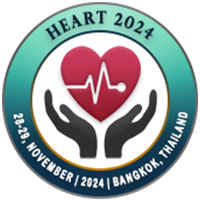
Anzhelika Postol
, Federal State Budgetary Institution , RussiaTitle : The need for therapeutic effects of implantable cardioverter-defibrillators in patients with indications for the primary prevention of sudden cardiac death
Abstract
The study aims to analyze the triggers of ICDs in patients with various origins of cardiomyopathies and a high risk of sudden cardiac death (SCD) to assess the effectiveness of the modern strategy of primary prevention of SCD. From 2014 to 2018, 165 patients were implanted with ICD and CT-D in the “Federal Center for High Medical Technologies” in Kaliningrad. The patients were divided into 2 groups: (1) 101 (61.2%) patients with ischemic CMI (ICMI); (2) 64 (38.8%) patients with non-ischemic CMI (NCMP). In the group of patients with ICMP, triggering was observed in 44 (26.7%) patients in patients with NCMP — in 11 (6.7%). Adequate responses in group 1 were in 33 (20.0%) patients, inadequate - in 11 (6.7%). In the 2nd group (NCMP), 2 (1.2%) had adequate electrotherapy, 9 (5.5%) had inadequate electrotherapy. In 17 (10.3%) patients with ICMP, stable ventricular tachycardia (VT), not reaching the detection frequency for ICD therapy, stopped spontaneously. The differences in the number of patients within each group who received adequate responses are statistically significant: in the ICMP group — 33 (32.6%), in the NCMP group — 2 (3.1%). By the end of the follow-up period, 68 (67.3%) remained in the group of patients with ICMP who did not have justified ICD responses, and in the NCMP group, there were 62 (96.9%). Potentially arrhythmogenic fibrotic changes of the myocardium were detected among all patients with ventricular tachycardia (VT) and justified defibrillator triggers, according to MRI with gadolinium. There was a higher need for ICD interventions in patients with ICMP compared to patients with NCMP. We note the low efficiency of traditional selection criteria (left ventricular ejection fraction <35%, FC II-III CHF according to NYHA, for devices for SRTD-II-IV class CHF) in the primary prevention of sudden cardiac death using implantable cardioverters-defibrillators for patients with non-ischemic cardiomyopathies.
Biography
Anzhelika Postol is a practicing cardiologist, electrophysiologist with work experience more than 22 years. She holds a PhD from the Sechinov First Moscow State Medical University. Her thesis topic is “Possibilities of improving the effectiveness of implantable cardioverter-defibrillators and devices for cardiac-resychronizing therapy of defibrillators in patients with a high risk of sudden cardiac death”. She has 37 publications.

